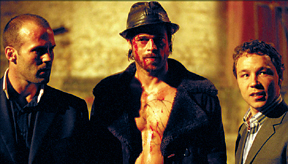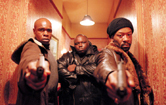Snatching Success
Ritchie discusses his sophomore effort
By Bert Osborne

“I don’t care, Mr. Ritchie! Look what she did to Brad!
You can’t let Madonna hang around the set anymore!”
Director Guy Ritchie's seedy British crime caper Snatch is an ostensibly outrageous "comedy" in the dubious tradition of such violent laugh-riots as Pulp Fiction, Trainspotting and Fight Club - the latest in a growing genre of movies made by show-offs whose kinetic visual styles and non-linear narrative approaches effectively sensationalize the activities of a lot of reprehensible low-lifes. Most people would cross the street to avoid the assorted gypsies, tramps and thieves on view in Ritchie's new film, which instead asks audiences to embrace its characters as eccentric and endearing, hip and hilarious.
"Well, it IS a comedy, after all," Ritchie maintains during an interview last weekend. Still, ask him exactly what's so comedic about it, and he admits, "I'm not quite sure what the definitive answer to that is. I mean, there's no question that, like so many things in life, there's an unfortunate irony in the fact that a lot of criminals are funny guys. A lot of them aren't, but I'm not so interested in those ones... If you're not in or of that world, then it's completely unacceptable, of course, but that's just human nature, and there's a certain humor within that, too."
Whatever "unintentional" thematic similarities his sophomore effort happens to share with those other aforementioned laugh-riots, Snatch is decidedly derivative of at least one film - Ritchie's debut, Lock, Stock and Two Smoking Barrels (1998). In an attempt to avoid being pigeonholed so early in their careers, some directors might want to hang an artistic 180 of some sort between their first and second projects. Ritchie, on the other hand, chose to remain on the mean streets (and back alleys) of London.
"My style is something that will evolve over time. I'm sure as I go on, it will change into something different and better, hopefully, but you have to start somewhere," the 32-year-old director offers with a shrug. "I specifically wanted to make a film that was in the same vein as the last one, partly because I had such a proliferation of ideas while I was making the first one that I would've felt like I was robbing the audience had I not gone on to make a second movie about these characters and subcultures."
You may love his work or loathe it, but there's definitely something to be said for staying true to oneself. Ritchie could've taken the money and run to Hollywood after the moderate art-house success of Two Smoking Barrels, but he opted to resist the temptation "because I think it's very important for a filmmaker to use his second project as a way of building his own confidence and establishing his own identity," as he puts it.
After a pause, Ritchie elaborates, "My perception of the Hollywood system is that it can emasculate you if you're not careful. I mean, unless you've allowed your confidence to evolve to a certain level, the minute your vision becomes controlled or dissipated by a studio, that can be the death of you creatively. I got some beguiling offers, but I thought it would be more sensible to stick to my own guns, as it were, so that I can tread the minefields of Hollywood more judiciously in the future."
By casting familiar American stars like Brad Pitt and Benicio Del Toro in the ensemble of Snatch - which also includes a number of the same still-unknown British non-actors he used in his first film - Ritchie says he hopes to "bridge the gap a little" between his own indie sensibilities and the more commercial considerations of a mainstream Hollywood movie.
"It's not strictly true, because The Full Monty proved to be very popular over here, but I think it might be too much to ask American moviegoers en masse to go see a film that's completely British," he explains. "Snatch is much more of a young person's film (than The Full Monty), and I don't think it's ever happened before, successfully releasing an English film to a younger audience in the States. Having a couple of recognizable stars in the cast helps sweeten the pill somewhat."
What next? A more straight forward or "linear" Guy Ritchie movie? He laughs. "I hope not. I'm not particularly interested in linear narratives. If there are elements in your story that warrant it, that's fine, but on the whole this is a medium with a great deal of latitude, in terms of playing around with the camera and juggling things up a bit," Ritchie replies.
"I think it's important for filmmakers to capitalize on that. I mean, sometimes a simple, linear story can be great, but I'm at a stage now where I'm still excited about all the possibilities of the format I've been presented, you know? I just want to keep exploring and exploiting all the tools at my fingertips."
by Rob Bricken
Director Guy Ritchie made this film while in the process of giving Madonna a baby. One can't help but wonder whether life with the material girl had some bearing on Snatch, at least title-wise. Ritchie's effort seems as though he was tired, spent... or more optimistically, just playing with the wee baby Virgin during the crafting of this film. It's not that Snatch is bad; in fact, one has to admit that's it's rather engaging, well-crafted and entertaining - but all in a way that fails to satisfy.
 Crime can be tough on the knees.
Crime can be tough on the knees.
Snatch is the story of about a dozen characters - thugs and thieves for the most part- all dealing with one caper in the world of diamonds, boxing, and organized crime. Some of the more noticeable ones are Benicio Del Toro as the first thief of the diamonds, Ritchie regular Jason Statham as the boxing promoter Turkish, Alan Ford as one bastard of a criminal overlord (with a pig farm), Brad Pitt as a nigh-incomprehensible gypsy boxing bad-ass, and a score of others. Really, no pro/antagonist is central, each character is given about the same time and depth.
Ritchie did this before in Lock, Stock, and Two Smoking Barrels, and many critics found it too damn mystifying, with all the characters and plotlines, quick changes, and British accents. Ritchie seems to pull it off better in Snatch; he may have had to resort to using the intro as a role-call for the dozen or so most active characters, but it works. Big name stars help us simple Americans (pronounce like Bush would, A-mehr-kuns) differentiate them from all the Brits. Those who enjoyed Lock, Stock may have less trouble, or maybe more - Ritchie again uses Vinnie Jones and Jason Flemyng (along with Statham). But this does more to highlight how similar Snatch is to its director's debut.
It helps greatly that the characters are so unique. Ritchie weaves between their stories like a monkey on heroin, sometimes rewinding, sometimes fast-forwarding as he deems fit. Each character's plot is given a minute or two, then on to the next, and they all intersect - not in a nice, simple Pulp Fiction way - but like Ritchie threw all the pieces of the film in the air and then taped them all together. This is done rather masterfully for having such a complicated storyline. Although most of the plots intersect by weird coincidence, it's not confusing as long as the audience pays attention and is willing to roll with it. This movie is not told for the dim; there's a lot going on, and little time to catch your breath. The only thing that keeps it from being totally obnoxious is how well it's done.
Snatch is good. It's clever, well-paced, and has a lot of great dialogue. The acting is all easily on the above average to superior level. There's plenty of great action, and a fair amount of humor. There's some exceedingly clever camera work. The music rocks.
It's clever and funny, and action-packed like we've seen before. Snatch is the same old hip, funny crime movie done over again. Even the clever camerawork feels like all the other clever camerawork done before. It's funny, but how many knock-knocks jokes can you hear before you're done? How many hardened criminals can wax Seinfeld-esque on hiding bodies until the humor is old? And while the performances are great, the characters are the same cartoon thugs-they've got no depth, and by introducing several million of them every 20 minutes through the film, Ritchie keeps us from caring about any of them. Which is fine, it keeps Snatch entertaining, but ultimately unrewarding.
Ritchie films have been called British Pulp Fiction's for a reason. Besides the same genre, both films have multiple, interconnecting storylines, plenty of characters, and a general air of thuggery about them. Pulp Fiction runs several feet deeper than Snatch, though the visual style of Snatch leans over Pulp Fiction. Conversely, if you'd like a little less thoughtful, more hiphop action-oriented Pulp Fiction, you'd do well to see some Snatch.
Snatch is the type of movie we Americans have been eating up ever since Pulp Fiction, and that Britain has been exporting (as per law) ever since Trainspotting's success. Snatch is entertaining, you can eat some popcorn with it. But you won't ever think about it again, and you may feel vaguely hurt as two hours of your life flit to something you neither enjoyed or disliked.